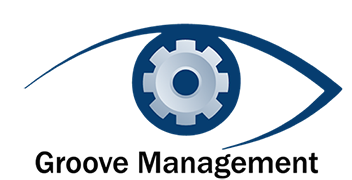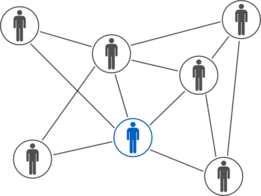NETWORKING: IT IS NOT WHO YOU KNOW BUT WHO THEY KNOW
As a social psychologist and organizational development practitioner, I like to look for patterns in human behavior. One pattern that I have discovered through building my consulting practice revolves around business development and networking. What I have found is that the majority of my work has come through connections, which is not surprising, but what is surprising is the fact that most of the work has not been for people who are my first level connections. My work has been generated through second level connections, “friends of friends”. At first thisseemed a bit surprising, but upon further reflection it makes perfect sense.
did not deliberately set out to build my business through second level connections. Upon starting Groove Management, I reached out to my network via email, phone, LinkedIn and face-to-face meetings. I shared my business pitch and asked for their business. I expected to generate a significant amount of business from the people I trusted and had worked with in the past. What I found was that only a few of my connections hired me. People are reluctant to hire friends or former colleagues because they fear that their organization’s my see this as an unfair practices.
Over time, what I found was that I began getting calls from people outside of my network who mentioned that they were put in touch with Groove Management by one of my first level connections. Those calls converted into work and are the basis upon which Groove Management has grown.
Recently I was helping a few friends and former colleagues who are in career transition. They have been tapping their networks trying to land new jobs. Each hopes to be hired by one of their first level connection’s organizations. I explained my findings regarding the power of second level connections and advised them to leverage their connections for introductions to people they don’t know.
“Who do you know that I should meet that is not in my network?”
This approach of using one degree of separation is quite powerful. Your first-degree contact serves as a reference and endorser of you and your capabilities. This immediately provides you with the credibility you need to get the attention of a new connection.
This same approach definitely could carry over to dating. While I have been out of that game for twenty plus years, it does appear that people are quite likely to find love through friends of friends versus people they already know. Think about the number of match makers and blind dates that occur thanks to friends of friends.
LinkedIn has built a very powerful and effective business by helping people to expand their networks. Forget about six degrees of Kevin Bacon, all you need is two degrees of you to have personal success.
So whether you are looking for a new job, driving sales for your organization, building your business or looking for love try leveraging your connections for introductions to their connections.
“It is not about who you know but about who they know.”
Social networking makes connecting at the second degree easier than ever. If you deliberately focus on connections one degree removed from you, you will find a greater level of success.
I am curious to gain your comments, feedback and results of trying this approach. Feel free to share by commenting on the post on LinkedIn at Networking: It is not about who you know, but who they know or via email atbformato@groovemanagement.com



